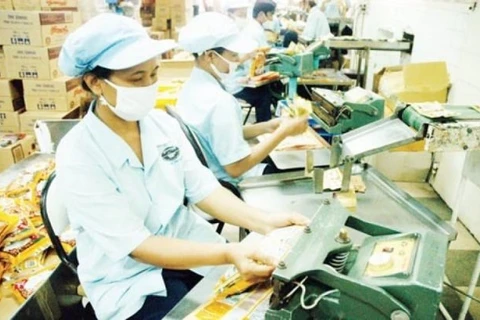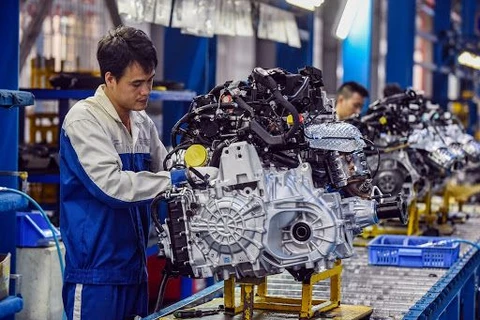Hanoi (VNA) - The most serious impact of COVID-19 on firms is the lack of cash flows, which directly hits their survival.
A recent survey by the Vietnam Chamber of Commerce and Industry (VCCI) showed that 85 percent of businesses have their markets narrowed, forcing 60 percent of them to face cash flow problems. This has pushed them to the brink of bankruptcy, where the ability to continue is being counted by mere months. Specifically, half of the respondents said that they are able to sustain operations for six months. 30 percent said they could only survive for about 3 months.
The results are similar to the global research report of the Association of Chartered Certified Accountants (ACCA). In Vietnam, 47 percent of enterprises faced difficulties in cash flow due to consumers buying less.
Financial “shocks”
Director of the Handicraft-Agricultural-General Production and Import-Export JSC (Hagimex) said his company majors in processed fruit and vegetables and spices for export to the US, Europe and the Republic of Korea. Due to the pandemic, the company has lost some orders from the RoK and Europe, pushing down its revenue by about 30 percent.
“The post-COVID world market is unpredictable. The company's decline in revenue could not stop at 30 percent but further. If that happens, budget for salary and new investments will be hit,” he said.
In a similar situation, Nguyen Khanh Tung, Director of the KC Ha Tinh One Member Co. Ltd said the company's revenue has been hardest hit ever. The company is looking for new orders and hopes it will only take a few months to get back to production as before.
The Pepper Co. Ltd, meanwhile, faces another issue. Its Deputy Director Le ThiHoaiThuong said its traditional markets like India and Taiwan are shutting down and orders have been delayed. Export to the US still performs well but payment is late.
“Thanks to e-commerce, we received orders from major clients like Amazon, but difficulties arise due to the lack of capital that makes the company unable to expand production. Meanwhile, seeking bank loans is very hard because the company is facing cash flow issue”, she said.
Different policies at banks
Recently, the Vietnam Association of Seafood Exporters and Producers (VASEP) sent a document to the Ministry of Planning and Investment to report the impact of COVID-19 on the sector’s production and exports. Most firms met financial difficulties due to late payment by buyers. Moreover, falling export revenue also made it hard to pay bank loans.
According to them, lending rates remain high at present. Though several commercial banks offered lower rates, policies in localities are different.
Additionally, lower rates are only applicable to new loans. Businesses also incurred various kinds of fees such as domestic and foreign cash transfer fees, discount and account management fees, transaction fees, and others at banks.
The policy allowing firms to restructure their debt payment deadlines, enjoy debt exemption and reduction, and maintain debt groups for those affected by COVID-19, is carried out asynchronously in localities, credit institutions and banks. Several banks reduced lending rates for businesses such as Vietcombank but others like BIDV and Vietinbank must wait for directions from their headquarters. The policy is now only applied for loans in Vietnamese dong instead of US dollar.
Enterprises in debt group 2 (debts become late less than 30 days) will be ineligible for debt payment rescheduling or interest reduction.
Such a situation not only happened to firms in the fisheries sector but small and medium-sized enterprises too.
Director of the Safe Green Food Co. Ltd Hoang ThiHiensaid the company fully paid a credit package with a 9 percent interest rate in March but did not receive any support from the bank. Later, the company paid a six-month credit package worth 4 billion VND (173,9000 USD) at an annual interest rate of 9.3 percent. In April, the bank announced a preferential credit package with an annual rate of 8.5 percent for firms from April to September.
“Thus, our loans are completely outside of the bank's preferential credit policy. Because according to the bank's regulation, if the company pays the debt ahead of the time to receive the new loan, it will be fined, but the fine amount is sometimes even higher than the preferential rate”, Hien said.
Finding ways to unlock capital for businesses
In the face of financial issues caused by COVID-19, associations representing businesses also proposed policies to relevant authorities.
A representative from the Vietnam Paper and Pulp Association suggested that the banking sector should be flexible in terms of procedures so that firms could access capital and restore their operations.
In the Government’s draft Resolution on measures and tasks to remove difficulties in production and trade, step up public investment capital disbursement amid COVID-19, the Ministry of Planning and Investment proposed the State Bank direct credit organisations to cut operating costs to offer lower rates on new and existing loans, thus helping firms and people overcome difficulties.
The draft also proposed the State Bank of Vietnam continue with monetary and credit measures in line with Directive No.11/CT-TTg dated March 4, including rescheduling payment deadlines, offering interest exemption and reduction, maintaining debt groups for those hit by the pandemic, with a focus on micro and small-sized enterprises./.

























